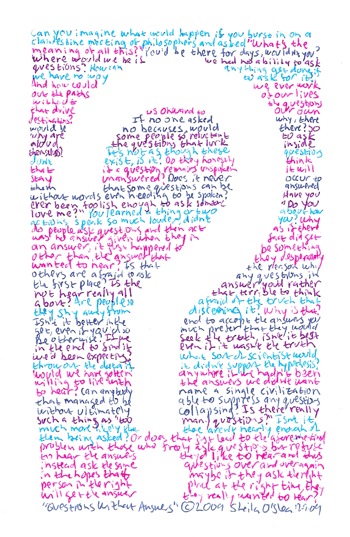On Wednesday nights at The Glenwood, a jazz combo led by a young man named Taylor Kennedy plays in the corner of one of the rooms. I’ve taken to toting my materials in a well-worn bag and spending a few hours there, sipping wine, listening to jazz and making art. Questions Without Answers is probably the first one I completed there, and it was a great deal of fun to create.
Can you imagine what would happen if you burst in on a clandestine meeting of philosophers and asked “What’s the meaning of all this?”
You’d be there for days, wouldn’t you?
Where would we be if we had no ability to ask questions?
How can anything get done if we have no way to ask for it?
And how could we ever work out the paths of our lives without the questions that drive us onward to our own destinations?
If no one asked why, there would be no becauses, would there?
So why are some people so reluctant to ask aloud the questions that lurk inside themselves?
It’s not as though these questions don’t exist, is it?
Do they honestly think that if a question remains unspoken it will stay unanswered?
Does it never occur to them that some questions can be answered without words even needing to be spoken?
Have you ever been foolish enough to ask someone “Do you love me?”
You learned a thing or two about how actions speak so much louder, didn’t you?
Why do people ask questions and then act as if there was no answer given when they in fact did get an answer, it just happened to be something other than the answer that they desperately wanted to hear?
Is that the reason why others are afraid to ask any questions in the first place?
Is the answer you’d rather not hear really all that terrible to think about?
Are people so afraid of the truth that they shy away from discerning it?
Why is that?
Isn’t it better in the end to accept the answers you get, even if you’d so much prefer that they would be otherwise?
If we seek the truth, isn’t it best in the end to find it even if it wasn’t the truth we’d been expecting?
What sort of scientist would throw out the data if it didn’t support the hypothesis?
Would we have gotten anywhere if we hadn’t been willing to live with the answers we didn’t want to hear?
Can anybody name a single civilization that managed to be able to suppress any questions without ultimately collapsing?
Is there really such a thing as “too many questions?”
Isn’t it much more likely that there aren’t nearly enough of them being asked?
Or does that just lead to the aforementioned problem with those who freely ask questions but refuse to hear the answers they’d like to hear and thus instead ask the same questions over and over again in the hopes that maybe if they ask the right person in the right place at the right time, they will get the answer they really wanted to hear?
I’d drafted the first two lines in a tweet to the infamous Torley, but, as usual, the line changed a bit as I wrote it into the artwork. I was quite fond of the opening and had it memorized to quote at people when I showed them the snapshot I’d taken of the finished product on my iPhone. The best response to it was probably from Tom Flynn, a professor of philosophy at Emory who suggested the reply would be “Congratulations; you’re now one of us.”
Prints of this work are available here.
The original is not for sale.


Leave a Reply